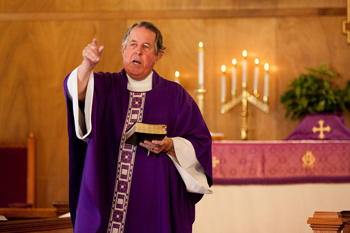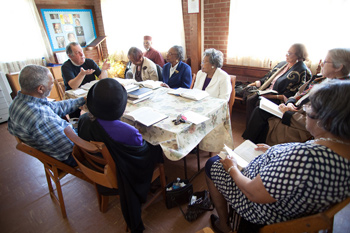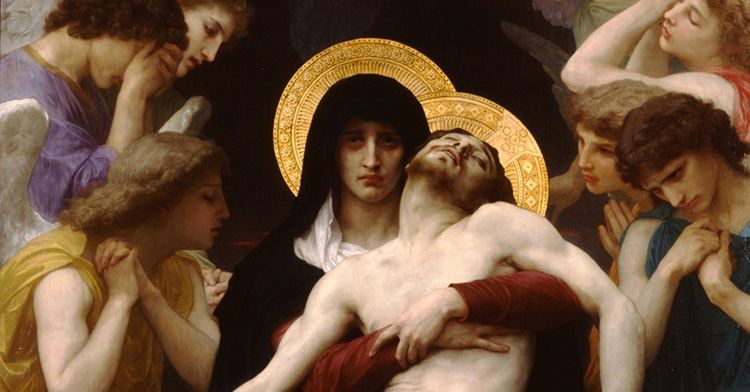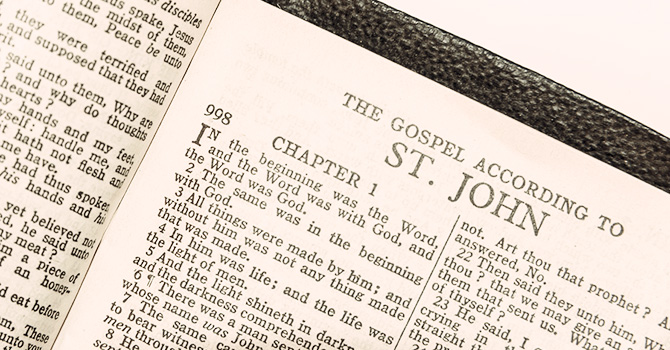Editor’s note: Faith & Leadership offers sermons that shed light on issues of Christian leadership . This sermon was delivered at St. Cyprian’s Episcopal Church, Oxford, N.C., April 4, 2010.
It was early on the first day of the week -- “still dark,” adds John, and for John such an added detail usually carries a couple of meanings. It’s not just that the sun had not come up yet; it was “dark.” Everything was confusion and unclear; nobody knew what was going on.
First chance Mary had, she made that long hike out to the cemetery.
“Something’s wrong out here,” she must have thought. “That big stone they put in place to keep the animals out and the body in -- that big stone is gone! I can’t deal with this.”
And so she ran to tell Peter and John. “They -- somebody -- have taken his body out of the tomb, and we don’t know where they have laid him!”
Grave robbers. That was her conclusion and also her fear.
Peter and John, grown men acting like boys, raced out to the cemetery. They didn’t just run; they raced out there.
John wins, but Peter is the impulsive one; he goes into the cave where they had put Jesus’ body. He sees the grave clothes neatly folded over on the side. He doesn’t know what to think.
Then John ventures in, sees the same empty scene -- and he “believes,” it says. Doesn’t understand, but believes anyway. To John, God does work together for good to all who love him. God can bring something good out of this whole crucifixion catastrophe.
And then … they both go home. What is that about? To have breakfast? To get a little more sleep? On Easter morning, after what they have just seen?
Mary couldn’t keep up with them running out to the cemetery, but finally she makes it back, and now she bends over and looks into the tomb. Two angels are there on either side of the slab, just like the mercy seat of the ark of the covenant from long ago.
And these angels speak: “Why are you weeping?”
“Because ‘they’ have taken away my Lord, and I don’t know where they have laid him.”
“They” -- the grave robbers.
She turns and sees this man standing outside the tomb.
“Sir, if you are the one who has taken his body, tell me where you have laid him, and I’ll take him away.”
“I’ll take him away.”
Where to? How? She wasn’t thinking right.
And then this man calls her by her name -- “Mary!” -- and all of a sudden, she knows. It’s Jesus! And she grabs on to him -- so fragile she, so wounded and broken -- “I can’t ever let him go!”
And Jesus asks her not to hold on to him but rather to go and tell the “brothers,” the disciples, that he was no gardener but the Lord; that he is no longer inside the grave but outside the grave -- that this is no longer Good Friday but Easter Sunday. And so she becomes the first person to see the risen Lord, and his first missionary and apostle.
Her words on Easter morning -- “I have seen the Lord!” -- are still being repeated, even until this day, April 4, 2010!
Three times Mary said it must have been grave robbers. That was something people did in those days to get at the gold and jewels and other stuff they buried with and on the body. They even robbed graves to study anatomy. The famous painter and sculptor Michelangelo used cadavers, brought out of the grave, to study the lines and shapes of human bodies for his painting. They are still robbing the graves of Egyptian pharaohs: King Tut’s body is shipped around the world so people can look at it in museums. Won’t let them rest in peace.
Mary must have thought, “As if what they did to his body on Friday wasn’t awful enough, they want to further mutilate it.”
But I want you to know this morning that we worship a grave-robbing God! Jesus had given them a sign just weeks before, when he went over to the grave of his friend, Lazarus, and robbed it, emptied it, vacated it. “Lazarus, come out!” he had called out. And out of that grave Lazarus came, all the grave clothes still wrapped around his body.
The grave has a ravenous appetite. The mouths of all these graves and columbaria are insatiable. They cannot be satisfied: “More bodies. All bodies. Bring them to me.”
But God is a grave-robbing God. He said to Lazarus, “Come out!” He said to Jesus, “Come out!” He will say to each and every one of your loved ones, “Come out!” He will say to Martin Luther King Jr., assassinated this day in Memphis, Tenn., “Come out!” He will say to Dickie Marrow, “Come out!” And they will all come out.
Just like Lazarus did. Just like Jesus did. God robs graves of their prisoners. And he frees them and makes these prisoners live again.
Mary finally got it. Peter and John finally got it. The church finally got it: We serve a grave-robbing God. Not like other grave robbers who just rearrange things, bury that body somewhere else.
God makes graves useless. Beats the enemy at his best game. Destroys death. “Death has been swallowed up in victory.” Death has been buried. “Where, O death, is your victory? Where, O death, is your sting? ... But thanks be to God, who gives us the victory through our Lord Jesus Christ!” (1 Corinthians 15:54-57 NRSV).
So shout your alleluias this morning. Honk your horn as you drive past Old Oxford Cemetery on Linden Avenue, or any cemetery. Won’t be needing these too much longer. So come a-running, John and Peter; go a-running, Mary Magdalene. It all started with you this morning a couple thousand years ago, and with Jesus. Don’t let graves scare you anymore. It’s all over for them.
Christ is risen. He is risen indeed. Alleluia! And so are we. God is stronger than death or anything else that threatens us. He’s still robbing graves.















